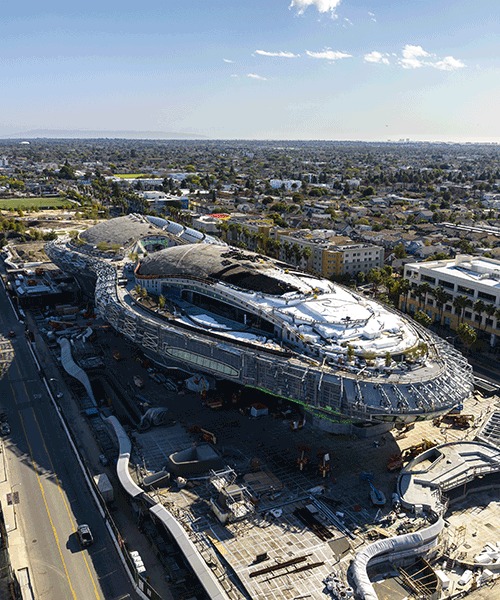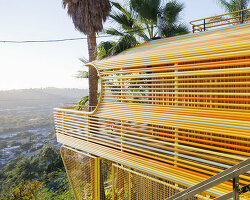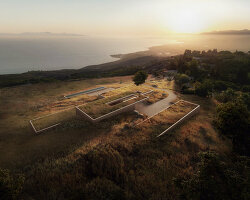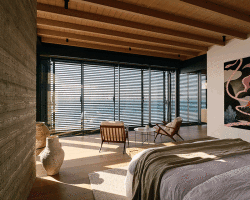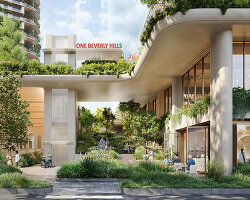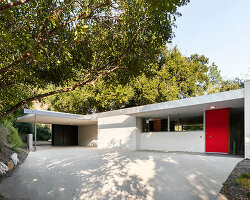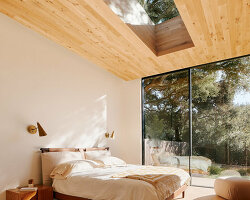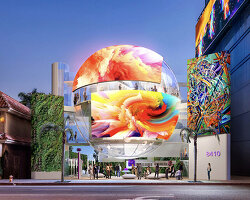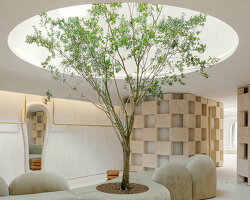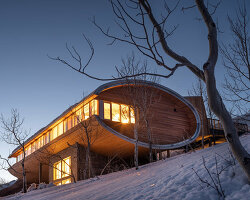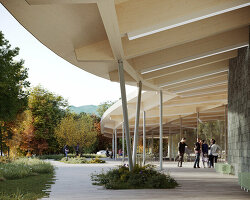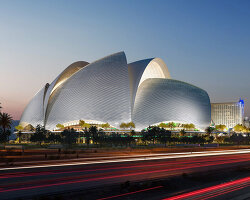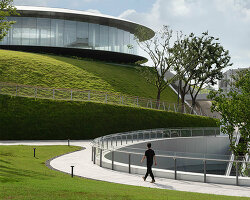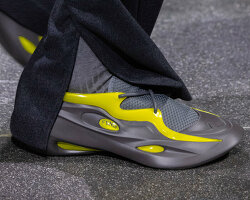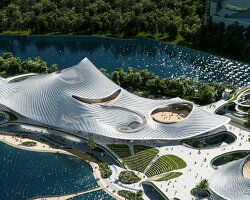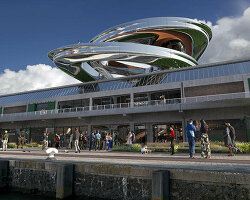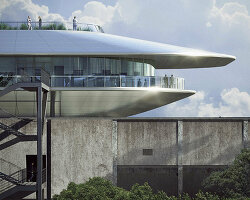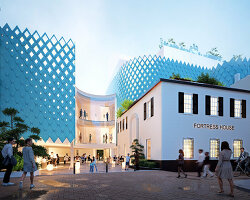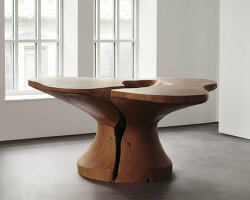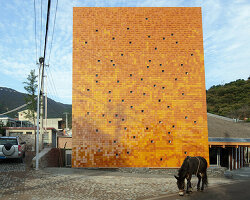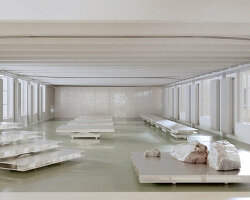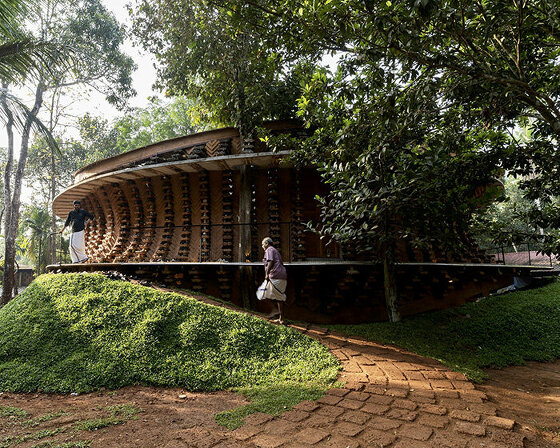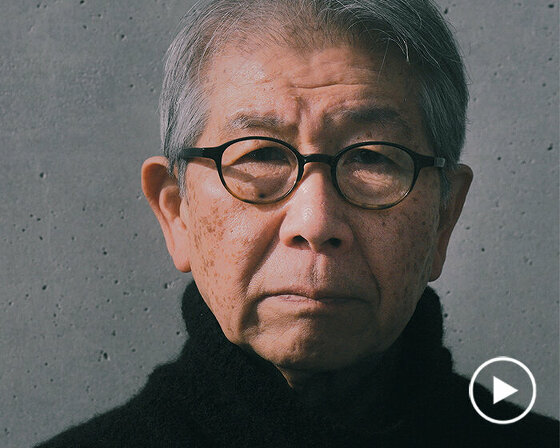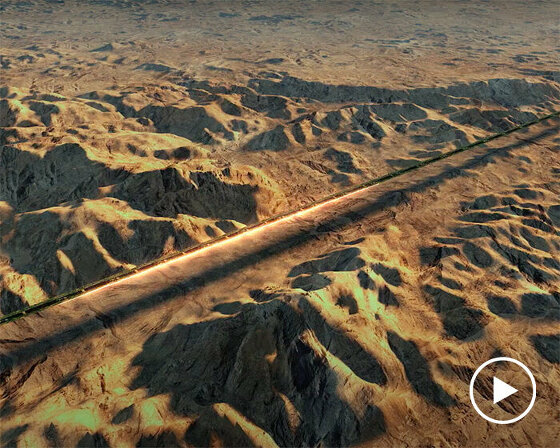a floating canopy over Los Angeles
Los Angeles‘ Exposition Park is undergoing a significant transformation as the MAD Architects-designed Lucas Museum continues to take shape (see visualizations of the project here). Spearheaded by filmmaker George Lucas, the curving volume is sculptural and complex as it rises from the ground in stark contrast to the more traditional structures that surround it. An important aspect of the overall masterplan is its commitment to creating a shaded, green oasis. Previously dominated by parking lots, the area will be reborn as a walkable, landscaped gathering place amongst the car-centric city. Over two-hundred new trees have already been planted on the site surrounding the museum, overseen by landscape architect Mia Lehrer, with a focus on native and drought-tolerant species. This transformation prioritizes people over cars, creating a much-needed green space for the community of South LA. designboom visited the Lucas Museum to explore the ongoing project, step inside to see the building take shape!
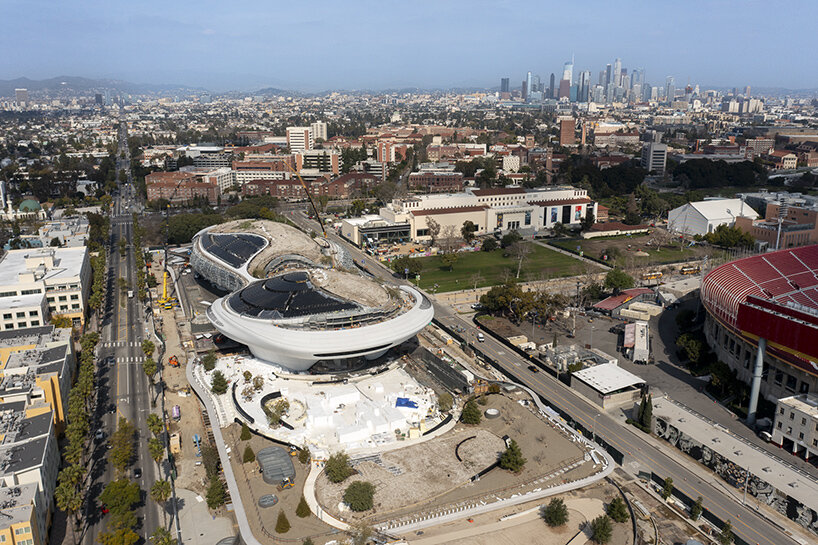
aerial construction view, February 2024 | image by Sand Hill Media/Eric Furie (all images © 2024 JAKS Productions)
the building meant to move
The team at MAD Architects designs the Lucas Museum to lightly touch the ground of the Los Angeles park at only a few points. A central archway spans 185 feet over a public plaza to create a new threshold to Exposition Park which provides access to the museum’s north and south lobbies. Here, an elliptical Oculus hovers four stories above ground, opening a view from the public plaza toward the sky. Once the museum is complete, this Oculus will serve as a central meeting point for visitors as it penetrates all gallery spaces across all levels of the building.
The structure is designed to adapt to the earthquake-prone city of Los Angeles. ‘The building is essentially constructed like a giant roller skate,’ Director and CEO Sandra Jackson-Dumont told designboom. With forty-two inches of space on either side of the footprint, it allows for flexibility of movement, so that it can gently roll laterally in the event of an earthquake. This innovative approach ensures its longevity while embodying the dynamism of the city it calls home. ‘This will be one of the safer places where people can be in the city during an earthquake,’ she notes.
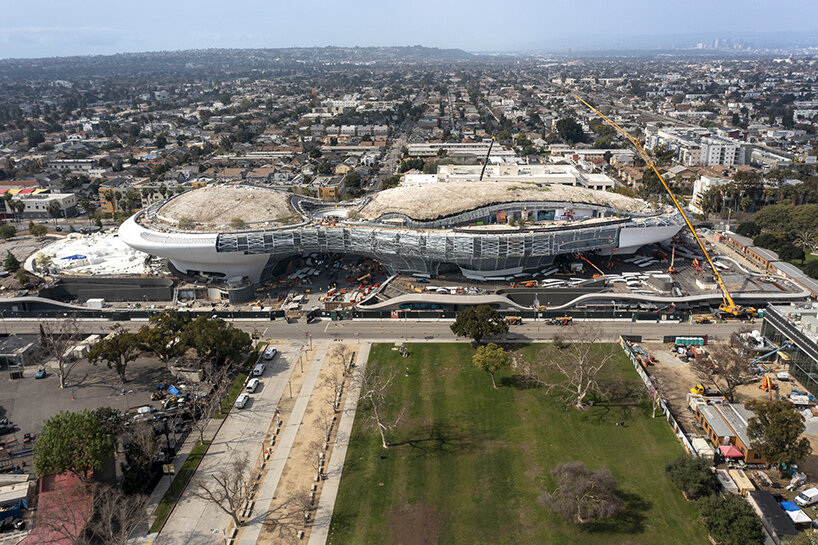 aerial construction view, February 2024 | image by Sand Hill Media/Eric Furie
aerial construction view, February 2024 | image by Sand Hill Media/Eric Furie
mad architects rejects the right angle
The biomorphic form by MAD Architects informs the entire experience of the Lucas Museum. Clad with a skin of over 1,500 unique panels of fiberglass-reinforced polymer (FRP), the building’s complex curves translate into the museum’s interior. ‘These spaces show our dismissal of the right angle,’ Jackson-Dumont continues, touring the fluid gallery spaces throughout the project. The vast gallery space on the fourth floor allows the building’s shape to be fully expressed, with walls echoing the curves of the exterior. ‘As you walk into this area, you’ll see that shape of the building on the inside,’ she illustrates. ‘There are moments where we will build walls that intersect with those exterior walls, but you will always feel the shape of the building within those sub-galleries.’
Even the event space, with its exposed rib-like ceiling structure, continues the theme of defying the traditional right angle. Described by the architects to resemble a cloud, the structure cantilevers far beyond its footprint. This, together with its organic profile, gives visitors the impression that the building is floating over the park. ‘The architect, Ma Yansong, saw the building as a cloud,’ Jackson-Dumont explains. ‘We see the museum as a convening space for people in LA, more like a tree canopy.‘
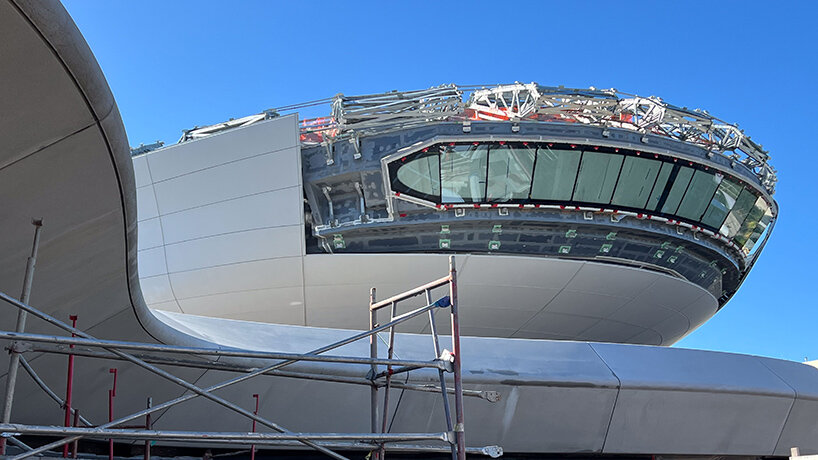
construction view, February 2024 | image by Roberto Gomez, courtesy USC School of Cinematic Arts
the lucas museum’s programming
The Lucas Museum offers a variety of public spaces beyond the main lobbies. On the lower floors, visitors will find two technologically advanced theaters, each capable of seating 299 people. There’s also a library and learning area designed in a horseshoe shape, featuring expansive windows overlooking the park. Ten dedicated studios and classrooms provide opportunities for creative exploration. Additionally, a museum shop, a cafe, and a sizable 10,000-square-foot gallery round out the offerings on the lower floors.
Five public elevators are located on the building’s north side. Three of these elevators are particularly eye-catching – cylindrical and made entirely of glass, offering dramatic views as they transport visitors from the north lobby to the fourth floor galleries, which together encompass 82,000 square feet. The fifth floor hosts nearly 8,000 square feet of additional gallery space beneath its ribbed ceiling. Here, visitors can also find a restaurant with both indoor and outdoor seating, a large event space, and an outdoor terrace with its green roof. 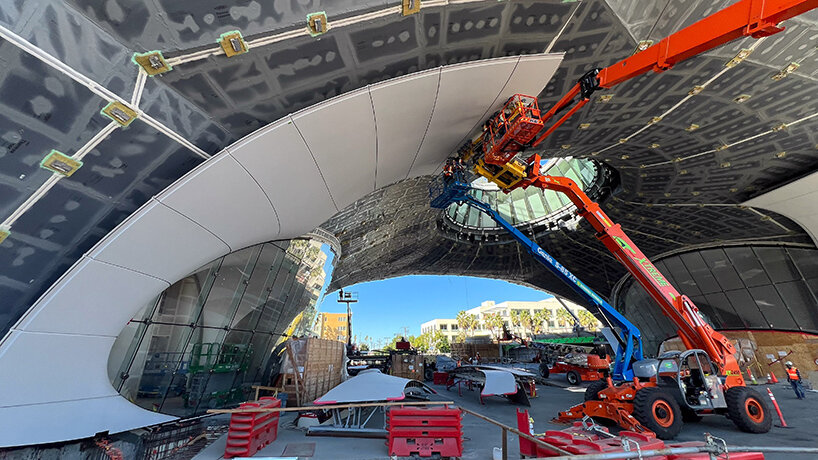
construction view in plaza, December 2023 | image by Roberto Gomez, courtesy USC School of Cinematic Arts
‘What’s happening in Los Angeles right now is incredible,’ Jackson-Dumont said, noting the impact the museum will have on the evolving city. ‘There are so many parts of Los Angeles that are expanding. All the galleries are moving in here, and a ton of artists are moving here. The cultural scene has been expanding. Normally when people think about the culture of Los Angeles they think about entertainment, but there is a shift happening. LA is alive.‘
‘When I think about the culture of LA, a lot of artists will be interested with this place. And I hope that they won’t just be engaged here at Exposition Park, but they’ll be engaged with the entire neighborhood of South LA.’
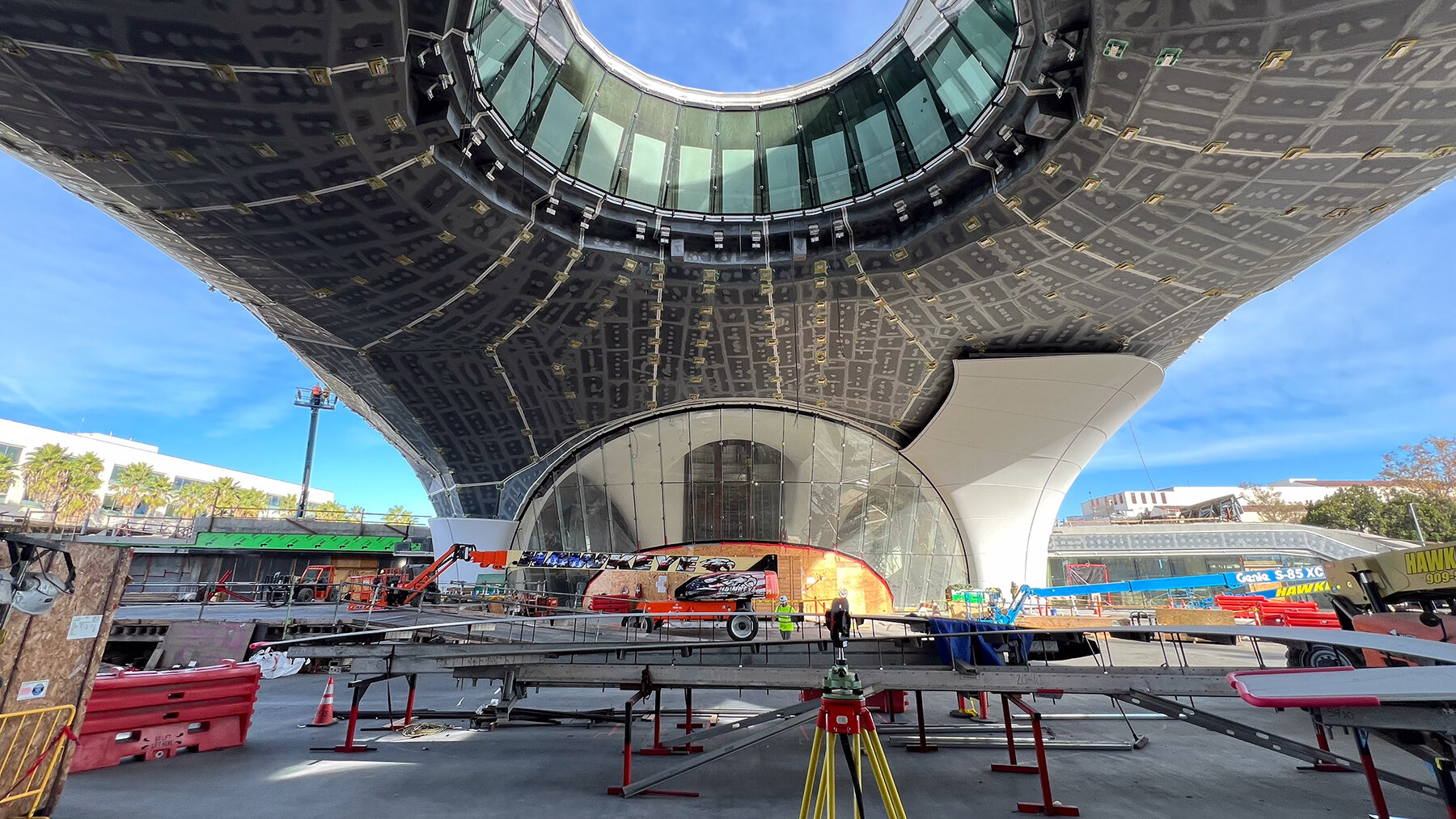
construction view in plaza, December 2023 | image by Roberto Gomez, courtesy USC School of Cinematic Arts
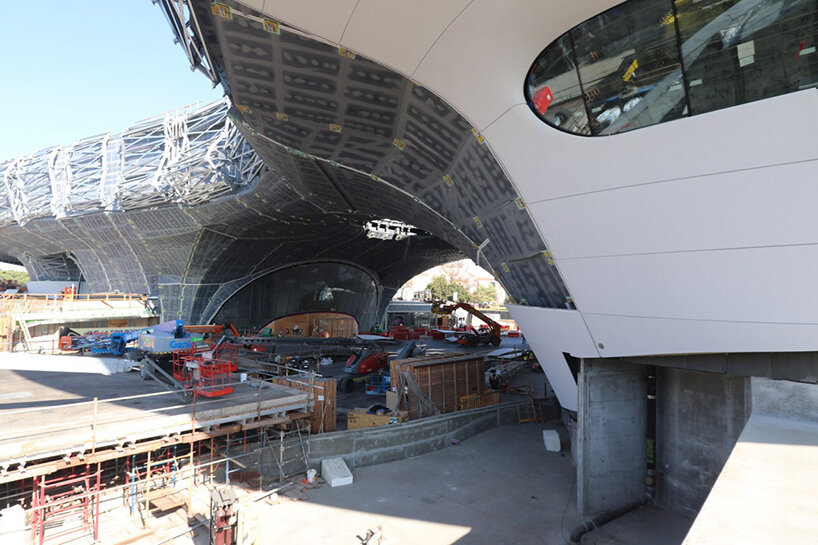
construction view in plaza, December 2023 | image by Roberto Gomez, courtesy USC School of Cinematic Arts
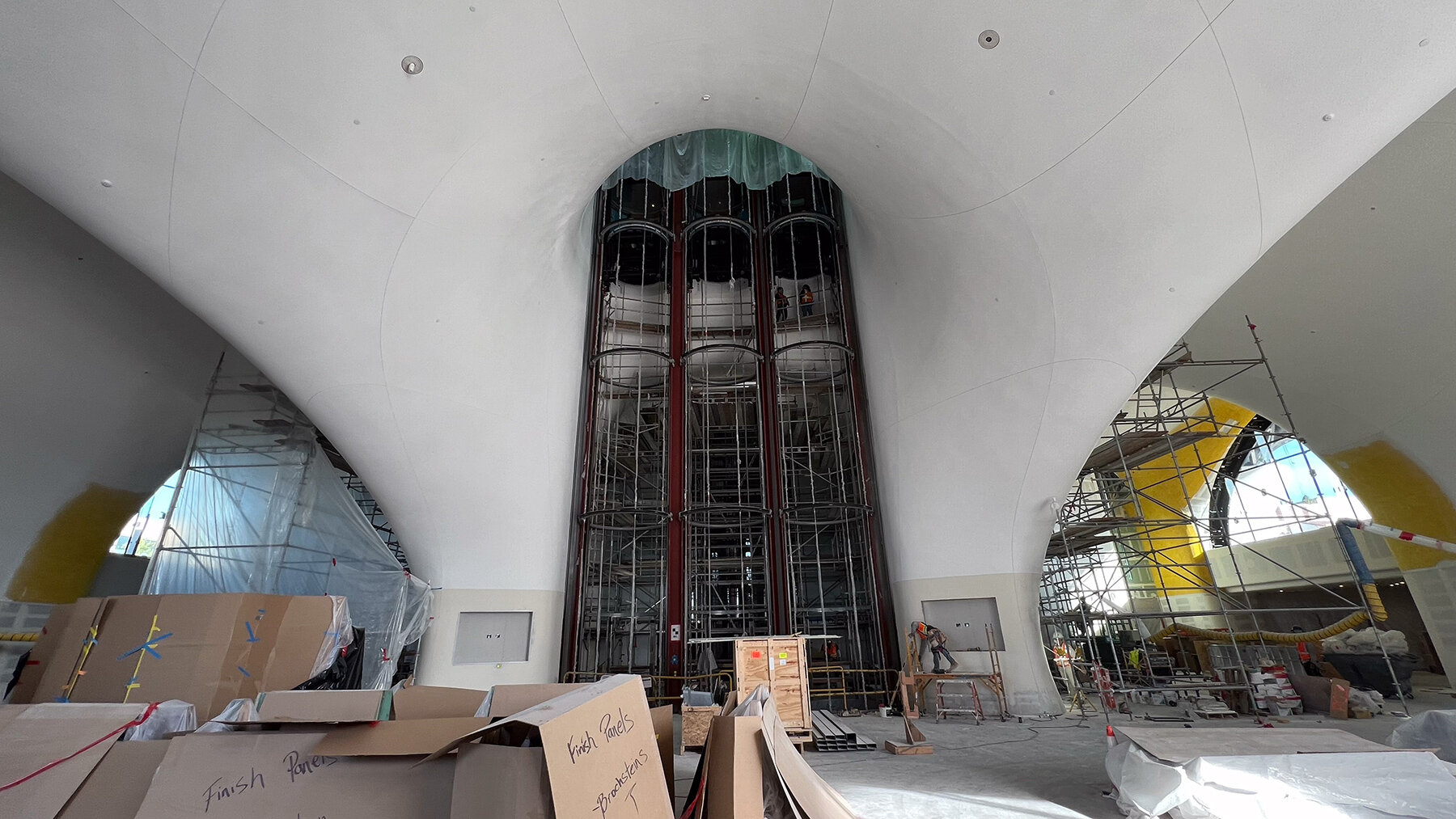
lobby construction view, December 2023 | image by Roberto Gomez, courtesy USC School of Cinematic Arts

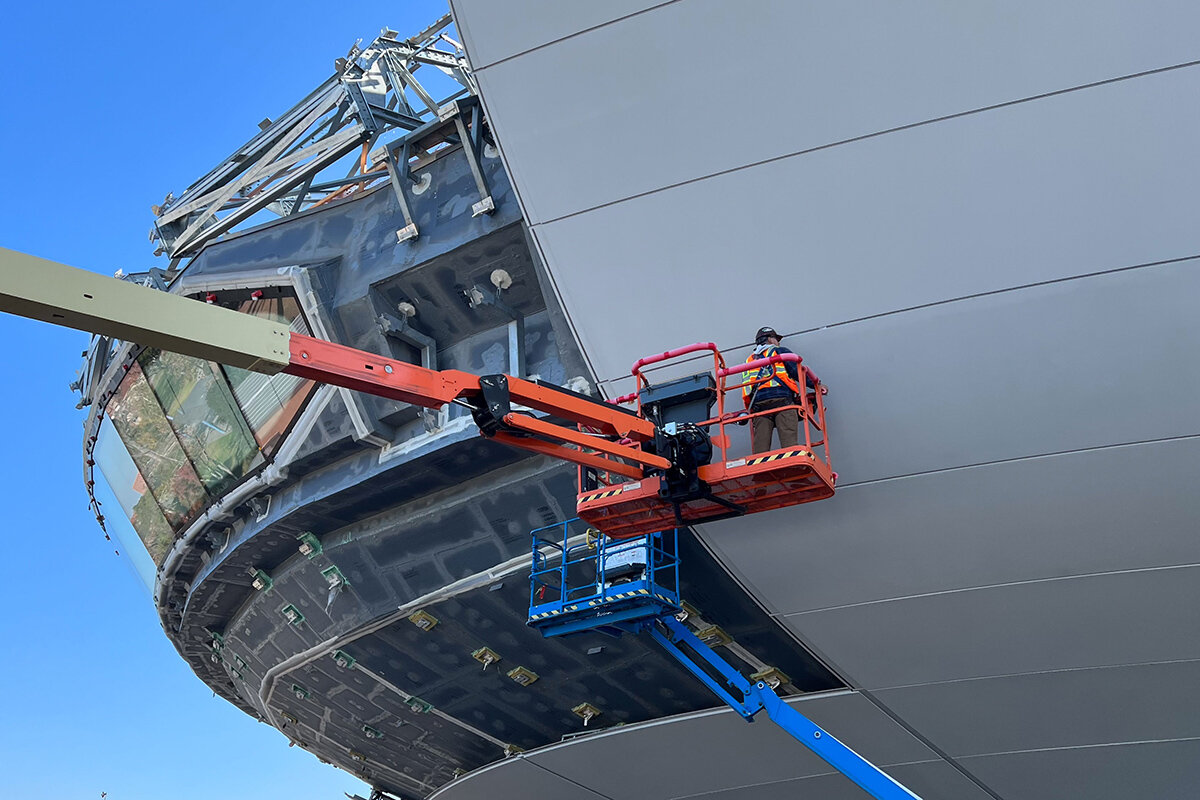

project info:
project title: Lucas Museum of Narrative Art | @lucasmuseum
architecture: MAD architects | @madarchitects
location: Exposition Park, Los Angeles, California
previous coverage: March 2018, February 2020, September 2022
photography: © Roberto Gomez, Sand Hill Media/Eric Furie
MAD Architects team: Ma Yansong (founder, principal partner), Lu Junliang (Dixon) (associate partner), Lee Flora (associate partner)
architect of record: Stantec (Michael Siegel) | @stantec
landscape architect: Studio-MLA (Mia Lehrer) | @studio_mla
construction manager: JLL (Cory Langer, Dustin Worland)
general contractor: Hathaway Dinwiddie (Rick Cridland)
structural engineer: LERA
mechanical, electrical, plumbing, fire life safety: Alfa Tech
MAD Architects partners: Ma Yansong, Dang Qun, Yosuke Hayano
competition and design team: Kin Li, Tiffany Dahlen, Daniel Weber, Jordan Kanter, Daniel Gillen, Wu Kaicong, Zhao Wei, Flora Lee, Jonathan Kontuly, Carmen Carrasco, Jacob Hu, Satoko Narishige, Zhu Yuhao, Casey Kell, Matthew Pugh, Kazushi Miyamoto, Ben Yuqiang, Hiroki Fujino, Chris Nolop, Kek Seow, Younjin Park, Brecht Van Acker, Andrea D’antrassi, Zhang Yiran, Pouya Goshayeshi, Dora Lam, Victor Tung, Steven Park Chaffer, Sean Tan, Sheenam Mujoo, Dookee Chung, Cesar D. Pena Del Rey, Valeria Pestereva, Wang Yiqi, Dmitry Seregin, Lin Yuyang, Che-hung Chien, Zhang Lu, Zeng Hao, Young Koo Kang, Shen Han
ARCHITECTURE IN CALIFORNIA (258)
ARCHITECTURE IN LOS ANGELES (122)
ARCHITECTURE IN THE US (1473)
MAD ARCHITECTS (148)
MUSEUMS AND GALLERIES (644)
PRODUCT LIBRARY
a diverse digital database that acts as a valuable guide in gaining insight and information about a product directly from the manufacturer, and serves as a rich reference point in developing a project or scheme.
